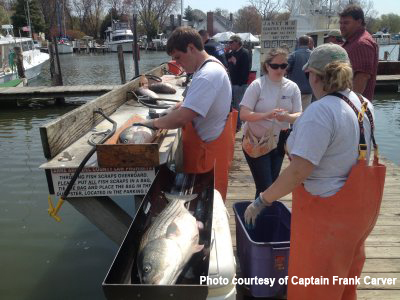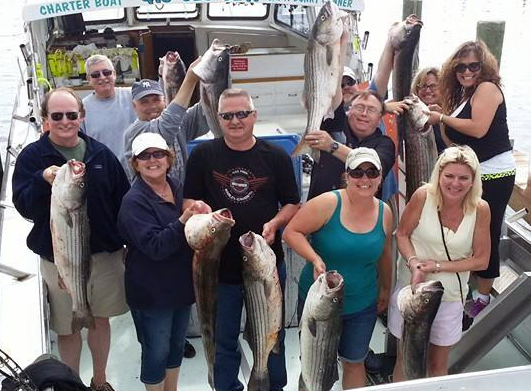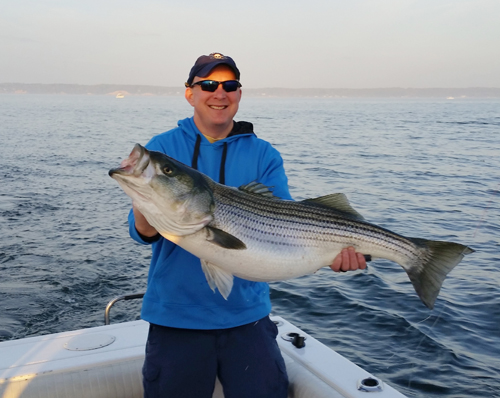The recreational fishery for striped bass is monitored through multiple surveys conducted by the Striped Bass Program. The harvest of striped bass during the spring trophy season (May 1 - May 15) is monitored through the
spring charter boat creel survey. The Access Point Angler Intercept Survey (APAIS) is conducted year round to obtain catch and effort data for multiple fish species, including striped bass. Additional data vital to determining the size composition of the recreational harvest is provided by cooperating anglers and charter boat captains through the
volunteer angler survey and the
volunteer charter boat survey.
Volunteer Angler Survey
Attention anglers! Get involved with fisheries management by participating in the
volunteer angler survey. A mobile version of the volunteer angler survey is now available through the AccessDNR app. Data that you provide on the sizes of striped bass caught and kept or released is combined with data collected by fisheries scientists to characterize the size composition of the recreational harvest. View the results of the
striped bass volunteer angler survey.
Spring Charter Boat Creel Survey
 The primary objective of the spring charter boat creel survey is to characterize the size, age, and sex composition of striped bass caught during the trophy season. Up to two different charter boat locations are visited per week, with a goal of sampling 60 striped bass per week. Striped bass are measured, weighed, examined to determine sex and reproductive condition, and a
scale and
otolith sample are retrieved to determine age. Data on trip length is also recorded for charter boats that are sampled to estimate a Catch Per Unit Effort for the charter boat fleet.
The primary objective of the spring charter boat creel survey is to characterize the size, age, and sex composition of striped bass caught during the trophy season. Up to two different charter boat locations are visited per week, with a goal of sampling 60 striped bass per week. Striped bass are measured, weighed, examined to determine sex and reproductive condition, and a
scale and
otolith sample are retrieved to determine age. Data on trip length is also recorded for charter boats that are sampled to estimate a Catch Per Unit Effort for the charter boat fleet.
Results of these surveys are reported annually in the Chesapeake Bay Finfish Investigations federal aid project report issued to the U.S. Fish and Wildlife Service by Maryland Department of Natural Resources.
Volunteer Charter Boat Survey

The purpose of this survey is to characterize the size structure and number of migrant and resident/pre-migrant striped bass harvested during the spring and early summer seasons until June 30th by the charter boat and fishing guide fleet. Each spring, a mailing is sent to charter boat captains and fishing guides that reported striped bass harvested in the previous year. The instructions ask to record the first 20 fish they catch each day from the beginning of the trophy season until June 30. These data are used to calculate the spring migrant harvest of striped bass, which is reported to the Atlantic States Marine Fisheries Commission.
Here is a link to our reports page with the
2022 Spring Migrant Harvest Report.
2023 Data
The graph below shows the results of the 2023 Volunteer Charter Boat Survey and shows the amout of striped bass releases between May 16 - 15 outweighs the amout released during this time.
Hover mouse over data points to see values and click to hide/show.
The Striped Bass Program is currently conducting additional studies on maturity and fecundity in striped bass with the primary objective of updating the maturity schedule (the age at which female striped bass become sexually mature). During charter boat sampling, ovaries from female striped bass are excised and stored in fixative. Ovary samples are later processed for histological determination of oocyte developmental stage and sexual maturity.
Private Boat Creel Survey
 From 2002 to 2017, the striped bass program conducted creel surveys in April and May each year as part of our spring recreational monitoring research. The creel survey is a tool used in fisheries management to evaluate a recreational fishery resource by interviewing anglers returning from fishing trips. Creel clerks intercept boats returning from fishing trips targeting striped bass and interview anglers to collect data about the numbers of striped bass kept or released and the amount of time and effort expended during a trip. Creel surveys were discontinued by the program after the spring 2017 season, however, these data are collected year round by the
Access Point Angler Intercept Survey (APAIS).
From 2002 to 2017, the striped bass program conducted creel surveys in April and May each year as part of our spring recreational monitoring research. The creel survey is a tool used in fisheries management to evaluate a recreational fishery resource by interviewing anglers returning from fishing trips. Creel clerks intercept boats returning from fishing trips targeting striped bass and interview anglers to collect data about the numbers of striped bass kept or released and the amount of time and effort expended during a trip. Creel surveys were discontinued by the program after the spring 2017 season, however, these data are collected year round by the
Access Point Angler Intercept Survey (APAIS).
Contact Information:
Simon Brown -
[email protected]
Jeffrey Horne -
[email protected]
